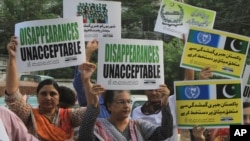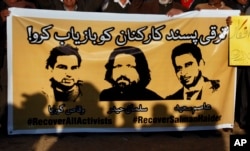A Pakistani social media activist has reached out to his family after a mysterious disappearance of 14 months.
Samar Abbas, a Karachi native, contacted his family Tuesday to inform them he would be joining them soon, local media reported.
"We received a call from Samar on Tuesday and he informed us that he has been released," Abbas' brother, Azhar Abbas, told the daily newspaper Express Tribune on Thursday. "He told us he is safe and will soon return home."
Samar Abbas, the head of Civil Progressive Alliance Pakistan, an anti-extremism activist group, disappeared from Islamabad in January 2017. A police case was registered in the capital against Abbas' kidnapping.
At the time of Abbas' disappearance, four other liberal social media activists also went missing from different cities in Pakistan. The four rights activists returned after a few weeks and left the country fearing for their lives after they were accused of posting "blasphemous content on the Internet" during their absence through a social media campaign.
Blasphemy remains an emotive and highly sensitive topic in Pakistan, and anyone labeled as a blasphemer can face dire consequences. The deliberate insult to Islam or the Prophet Mohammad in Pakistan can carry a sentence of life imprisonment or the death penalty.
Openly critical
The liberal social media activists apparently had raised their respective voices about political awareness, human and religious rights violations, religious intolerance and extremist ideologies. They also had openly criticized and challenged the actions and role of the country's establishment and military.
Two bloggers, Waqas Goraya and Asim Saeed, later blamed Pakistan's intelligence agency for their forced disappearances and said they were brutally tortured during interrogation.
Pakistan's government and armed forces denied any involvement in the bloggers' disappearances.
Several social media and rights activists have disappeared mysteriously in Pakistan during the past year, and some remain missing.
According to statistics submitted last year to the Apex Court by Pakistan's Commission of Inquiry on Enforced Disappearances, about 1,498 cases of enforced disappearances remained pending with the government.
In December 2017, peace activist Raza Khan, 40, was abducted from Lahore, and his whereabouts are still unknown. Khan raised his voice on rights exploitation in Pakistan and was vocal against the misuse of blasphemy laws. Khan also wanted to promote peace between archrivals India and Pakistan.
Civil rights activists in the recent past have constantly expressed fear that forced disappearances of social media and civil rights activists are aimed at silencing dissent in the country.






